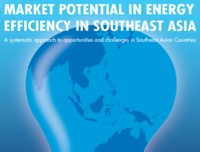Energy Efficiency Market in Southeast Asia is Huge
 Southeast Asia offers immense opportunities for
Southeast Asia offers immense opportunities forenergy efficiency technologies, but the market potentials need to
be tackled systematically by government and industry.
This is the key finding of a new study conducted by the
Sustainability Committee of the European Chamber of Commerce,
Singapore and Roland Berger Strategy Consultants.
The study: “Market Potential in Energy Efficiency in
Southeast Asia - A systematic approach to opportunities and
challenges in Southeast Asian Countries” was launched at the Clean
Energy Expo Asia 2011 in Singapore.
The study addresses the development of the energy demand, the
energy related investments and the spending in Southeast Asia, and
possible ways to address this increasing appetite for energy using
energy efficiency technologies.
Energy efficiency programmes offer large energy
saving potentials and open vast new business opportunities: by
2020, Southeast Asia could achieve efficiency gains between 12% and
30% and reduce costs by USD 15 billion to USD 43 billion. Mr Willi
Hess, Chairman of the EuroCham Sustainability Committee
comments:
“With rapidly growing need for energy and shrinking resources of
fossil fuels, energy efficiency technology is a paramount component
in progress towards a sustainable supply of energy in the
future.

At the same time, it has a potential to benefit
businesses by reducing costs to consumers, improve competitiveness
and enhance overall productivity.”
The study features opinions of prominent specialists from private
sectors on how to capture the energy saving potential most
effectively.
Although progresses in both government policy and
private sector initiatives can be observed in Southeast Asian
countries, the study identified barriers to be addressed at
multiple levels of the value chain to stimulate the diffusion of
energy efficiency technologies.
Jihong He, a principal from Roland Berger Strategy
Consultants, shares her view after extensive discussions with key
industry players:
“Many companies are facing several issues in
developing the energy efficiency market in Southeast Asia:
insufficient energy efficiency standards and governments policy,
expectation mismatch and information asymmetries among different
players along the value chain, as well as shortage of funding
options to finance energy efficiency projects. Awareness for energy
efficiency is still low for both businesses and consumers in this
region. “
Companies that participated in the study call for governments to
take decisive actions in the coming few years to promote energy
efficiency technologies, providing an overarching policy framework
by combining mandatory and voluntary policies, and playing an
essential role as the integrator of different players in the value
chain.
“At the same time, private sectors need to be more
pro-active in developing the energy efficiency market. We recommend
that suppliers add service components to their energy efficiency
products, extending their portfolio in order to offer a holistic
solution along the value chain,” commented Joost Geginat, managing
partner of Roland Berger Strategy Consultants Southeast Asia.
“Multinationals can act as catalysts by applying the
same guidelines for energy utilization and ensuring that best
practices are adopted across their international operations. These
companies can set the standard in energy efficiency for their
industries and act as role models in Southeast Asia.”
Source: www.rolandberger.com
You can return to the main Market News page, or press the Back button on your browser.

